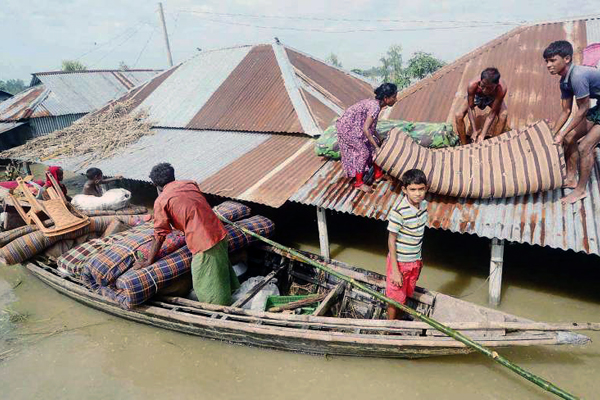Due to the ongoing terrible flood, millions of people in northern part of Bangladesh fall in an adverse situation. Flood protection embankments flash away daily, new areas down, destroying crops and the sufferings of the people with their livestock reaches in an extreme misery condition in line with the flood situation worsened further as the onrush of water from upstream was continuing, affecting around six lakh people in 20 districts, said Flood Forecasting and Warning Centre (FFWC) of Ministry of Disaster Management and Relief (MoDMR), Government of the People’s Republic of Bangladesh.
Five community radio stations have started flood Broadcasting in Northern Part of Bangladesh with the community people in a special disaster risk reduction focus. The Community Radio stations are; Community Radio Chilmari, Chilmari of Kurigram, Community Radio Sarabela of Gaibandha, Community Radio Mukti of Bogura, Community Radio Borendra of Naogaon and Community Radio Pollikontho of Moulvibazar in line with the Standing Orders on Disaster (SOD) of Government of the People’s Republic of Bangladesh.
The people of the riverside areas are passing days in panic-stricken uncertainty. people are facing scarcity of food and shelters. Road communication totally collapsed- as per the expert’s opinion “the effects of the flood seem to be more extreme than the 1998 situation”. Related government authorities ensured that they have taken possibly all preparation.
In the meanwhile, the community radio stations have broadcasted 23 hours programs related to the deadly flood situation. The programs were produced in the format of special bulletins, magazine programs, spot reports, interview and public service announcement.
The contents of the programs are on flood forecasting, precautionary measures for facing flood, ongoing flood situations, report on the affected areas, post flood situation and measures, and the role of the community people to protect and reduce the loss of lives and resources etc. In addition, the programs narrated- how to protect the children, women, pregnant mothers, older citizens, live-stocks and household stuff.
A total of 41 community broadcasters of 16 youth women and 25 youths have been continuously working in different community radio stations. It is to be noted that the broadcasters have obtained the Disaster Risk Reduction training from Bangladesh NGOs Network for Radio and Communication (BNNRC). The broadcasters are working closely with the local government authority.
The five community radio stations maintained full-time liaison with the disaster monitoring cells at district and Upazila administration. They also kept contact and collected updated information from the NGOs volunteers who were working hard with the disaster-prone community. Till to date, they have participated in 8 coordination meetings organized by the local government. They are getting updates, guidelines and aware about measures to be taken. Community radio stations are keeping a continuous connection with the district, upazilas and union Disaster Management Committees and the encouraging the communities with information for facing the deadly situation.
Community radios are broadcasting the interview of Upazila Nirbahi Officer, Chairman, Upazila and Union Parishad, District Relief and Rehabilitation Officer, Upazila Health Officer, Upazila Agriculture Officer, Upazila Education Officer, representatives of Disaster Management Committee and the victims and community people as well.
According to the Community Radio Stations- the villages goes under water in a sudden and road communication totally collapsed so food, safe drinking water, shelter and veterinary feed stock become in immeasurable condition. Besides, transportation, sanitation, and schooling situation are extreme too.
In post flood situation, child diseases, food supply, rehabilitation work, seed and seedling, Vet-feed, employment and maintenance of road communication will be the prior initiatives to settle up. Community broadcasters expect that government along with NGOs and other CBOs will take necessary steps jointly to make the community life easy. Community Radio broadcasters believe that “Together Everyone Achieves More” and the means to solve problems in stages.
BNNRC) is maintaining full-time contact and coordination with the five community radio stations. The contact points for the community radio stations are;
Mr. Boshiur Uddin, Station Manager, Radio Chilmari, Kurigram. phone: 88 01719 46 49 81. E-mail: boshir.radiochilmari@gmail.com
Mr. Mahfujul Haque, Station Manager, Radio Sarabela, Gaibandha. phone: 88 0173007 25 25. E-mail: mahfujfaruque86@gmail.com
Mr. Ariful Islam Chowdhury, Station Manager, Radio Mukti, Bogra. phone: 88 01735 9331 56. E-mail: acrm156@gmail.com
Mr. Shubrata Sarkar, Station Manager, Borendro Radio, Naogaon. phone: 88 01712 9240 62. E-mail: shubratasarkar10@gmail.com
Mr. Mehadi Hasan, Sr, Station Manager, Radio Pollikontho, Moulvibazar. phone: 88 0171198 5510. E-mail: mehedi.mh@brac.net
Mr. Kamaruzzaman, Disaster Control Room In-charge of Bangladesh NGOs Network for Radio and Communication (BNNRC), Dhaka Phone: 8801711131211 E-Mail: pc@bnnrc.net
It can be mentioned that BNNRC has supported the radio stations during the times of cyclone Mahasen , Komen, Roanu and Mora in the coastal part of Bangladesh thus helped to save the lives and assets of millions of the coastal region. BNNRC kept constant coordination with five Community Radio stations and provided information and guidance in the whole process.
Ministry of Disaster Management and Relief(MoDMR) has already created Interactive Voice Response (IVR) system Disaster Early Warning System Saving Lives & Livelihood and Emergency Alerts and Warnings through dedicated phone number 10941. Mass People Can Dial 10941 for Emergency Alerts and Warnings.
The Ministry has piloted the use of mobile technology involving Interactive Voice Response (IVR) to disseminate weather advisory and disaster early warning alerts to the population at-risk areas. Operating under MoDMR this facility provides the general public 24/7 access to receive updated pre-recorded multi-hazard early warning messages that are generated from Flood Forecasting and Warning Centre (FFWC) and Bangladesh Meteorological Department (BMD), Government of the People’s Republic of Bangladesh.


